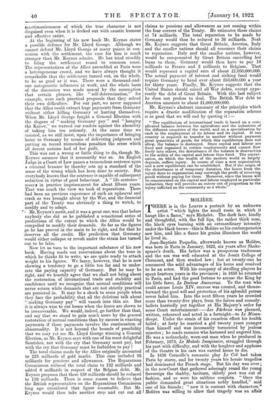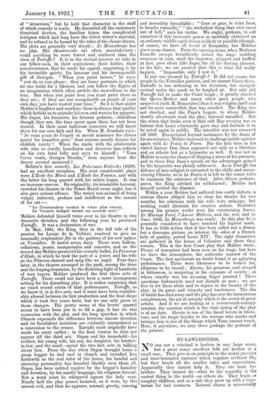MOLIERE. T HERE is in the Louvre a portrait by an
unknown artist " which lights the small room in which it hangs like a flame," says Michelet. The dark face, kindly and thoughtful, with the full lips, the rather thick nose, the black eyes burning with an extraordinary intensity under the black brows—this is Moliere as his contemporaries saw him, and like a flame his genius illumines the world he lived in.
Jean-Baptiste Poquelin, afterwards known as Moliere, was born in Paris in January, 1622, six years after Shake- speare's death. His father was a prosperous tradesman and the son was well educated at the Jesuit College of Clermont, and then studied . law ; but at twenty-one he renounced the solid advantages of his home and resolved to be an actor. With his company of strolling players he spent fourteen years in the provinces ; in 1658 he returned to Paris, and had the good fortune to amuse the King by his little farce, Le Docteur Amoureux. To the man who could amuse Louis XIV. success was assured, and thence- forward the good will and protection of his splendid patron never failed him. Into the next fifteen years he crowded more than twenty-five plays, from the farces and comedy- ballets hurriedly put together at His Majesty's order for some Court entertainment---Les Fdcheux was planned, written, rehearsed and acted in a fortnight—to Le Misan- thrope. Under the strain of his ceaseless effort his health failed at forty he married a girl twenty years younger than himself and was incessantly tormented by jealous miseries ; he made enemies who harassed and angered him. He was a melancholy, worn-out man when he produced in February, 1673, Le Malade Imaginaire, struggled through his part with difficulty, and with the laughter and applause of the theatre in his ears was carried home to die.
In 1636 Corneille's romantic play Le Cid had taken Paris by storm, and for twenty years his heroic tragedies had dominated the French stage.. But his day was over ; in the new Court that gathered adoringly round the young Sovereign the shabby, taciturn, elderly poet was out of fashion, and so were his sublime couplets. " Once the public demanded great situations nobly handled," said one of his friends ; now it is content with characters." Moliere was willing to allow that tragedy- was an affair of " situations," but he held that character is the stuff of which comedy is made. He discarded all the customary theatrical devices, the familiar types, the complicated intrigues which had long been the comic writer's material, and he refused to be bound by the rules of the classic drama. His plots are generally very simple ; Le Misanthrope has no plat. His dinottements are often unsatisfactory ; could anything be more forced and confused than the close of Tartuffe? It is to the eternal interest we take in our fellow-men, in their aspirations, their foibles, their misadventures, that he made his appeal, supporting it by his invincible gaiety, his humour and his incomparable gift of dialogue. " When you paint heroes," he says, " you do as you please ; they are fancy portraits in which no one looks for a likeness, and you follow the flights of an imagination which often prefers the marvellous to the true. But when you paint men you must paint them as they are ; if they are not recognizable as people of your own day, you have wasted your time." So it is that under Moliere's laughter and mockery there is always that quality which forbids us to mistake his men and women for puppets. His dupes, his feminists, his fatuous pedants,—ridiculous though they are, the time spent upon them has not been wasted. In their most ludicrous moments we still know them for our own kith and kin. When M. Jourdain says : " Je veux avoir de l'esprit et savoir raisonner des choses parmi les honnetes gens," does anyone merely despise his childish vanity ? When the rustic with the aristocratic wife who so cruelly humiliates and deceives him reflects on his own fatal folly and says to himself : " Vous l'avez voulu, Georges Dandin," does anyone hear the dreary avowal unmoved ?
Moliere's first comedy, Les Precienses Ridicules (1659), had an excellent reception. His next considerable plays were L'Ecole des Maris and L'Ecole des Femmes, and with the latter his long quarrel with his critics began. It was an immense success. Its originality, its irresistible humour, crowded his theatre in the Palais Royal every night, but it also gave serious offence. The writer was accused of being vulgar, indecent, profane and indifferent to the canons of his art :- " Le Commandeur voulait le scene plus exact°, Le Vicomte indigne sortait au seconde acte."
Moliere defended himself twice over in his theatre in two dramatic sketches, and the following year he produced Tartuffe. It was a declaration of war. In May, 1664, the King, then in the full tide of his passion for Louise de la Valliere, resolved to give an unusually resplendent fete in the gardens of his new palace at Versailles. It lasted seven days. There were ballets, collations, jousts, masquerades and concerts, and on the second day Moliere presented his comedy-ballet, La Princesse d'Elide, in which he took the part of a jester, and his wife as the Princess danced and sang like an angel. Four days later, in the theatre arranged in the park, among the trees and the leaping fountains, by the flickering light of hundreds of wax tapers, Moliere produced the first three acts of Tartuffe. There could not have been a more incongruous Betting for his disturbing play. It is rather surprising that no exact record exists of that performance. Tartuffe, as we know it, is in five acts, and it must have been consider- ably altered between its first production and the final shape which it took five years later, but we can only guess at these changes. The pretty scene of the lovers' quarrel seems to have been put in to fill a gap, it has no real connexion with the plot, and the long speeches in which Cleante expounds the difference between sincere devotion and its fraudulent imitation are evidently interpolated as a concession to the censor. Tartuffe must originally have made his entry earlier ; in the final version he does not appear till the third act. Orgon and his household--his mother, his young wife, his son, his daughter, his brother- in-law, and the maid—spend the two first acts in talking about him. From the day when Orgon brought home a pious beggar he had met in church and installed him forthwith as the real ruler of the house, his hateful and alarming personality has brooded blackly over them all. Orgon has been carried captive by the beggar's humility and devotion, by his saintly language, his religious fervour. Not a word must be whispered aganst the holy man. Nearly half the play passes haunted, as it were, by this unseen evil, and then he appears, sensual, greedy, cunning and incredibly formidable : " Gros et gras, le teint frais, la bouche vermeille," " the wickedest thing that ever came out of hell," says his victim. We ought, perhaps, to ask ourselves if this mesmeric power so suddenly exercised on an ordinary middle-aged citizen is likely or possible (though, of course, we have all heard of Rasputm), but Moliere gives us no chance. From the opening scene, when Madame Pernelle sweeps breathlessly across the stage scolding everyone in turn, until the impostor, stripped and baffled at last, goes silent (like Iago), for all his flowing phrases, to his fate, we are assured that this is what did really happen. " Impossible, only I saw it."
Is any one amused by Tartuffe ? It did not amuse the people in the Versailles gardens, and we cannot blame them. Tartuffe is too sickening in his devotion, too savagely cynical under the mask to be laughed at. Not only did Tartuffe fail to make the Court laugh ; it greatly shocked the Queen-Mother and many other good people, who suspected (with M. Brunetiere) that it was religion itself and not its mere counterfeit that was assailed. The King was not shocked, and the Pope's Legate, to whom Moliere shortly afterwards read the play, listened unruffled. But the storm that broke over it that soft May evening was so furious that Louis reluctantly gave way and forbade it to be acted again in public. The interdict was not removed till 1669. Exasperated beyond endurance by the doom of his masterpiece, Moliere hastened to challenge public opinion again with Le Festin de Pierre. For the first time in his varied history Don Juan appeared not only as a libertine and an atheist but as a hypocrite as well. It was not in Moliere to miss the chance of slinging a stone at his pursuers, and to them Don Juan's speech on the advantages gained by the hypocrite was plainly addressed. As in Tartuffe the defence of true religion is entrusted to the chilly and uncon- vincing Cleante, so in Le Pectin it is left to the comic valet to maintain the existence of God. After fifteen perform- ances, the King advised its withdrawal ; Moliere had himself invited the disaster.
Within a year Moliere had suffered two costly defeats, a serious illness obliged him to close his theatre for two months, his relations with his wife were unhappy, but nothing could diminish his creative ardour. Scattered among his greater works were his entertaining farces, Le Mariage Force, l'Amour Medecin, and the rest, and in June, 1666, Le Misanthrope was ready. In this play he is generally considered to have touched his highest mark. It has so little action that it has been called not a drama but a dramatic picture, an interior, the salon of a French lady of quality, period Louis XIV. The eight characters are gathered in the house of Celimene and there they remain. This is the first Court play that Moliere wrote. Plenty of marquises had been seen on his stage, but here we have the atmosphere, the authentic manner of the Court. The first spectators no doubt found it an agitating performance. There were likenesses to be looked for, allusions to be traced ; Alceste, his generous soul steeped in bitterness, is unsparing in his exposure of society ; at whom exactly was his accusing finger pointed ? These questions fortunately need not disturb us now ; we are free to let them alone and to rejoice in the beauty of the play, in its grace and vivacity and tenderness. The din of battle has died away and the play has now the harmonious completeness, the air of serenity which is the secret of great artists. And if we are looking at a seventeenth-century interior, the emotion which is the vital spring of the play is of no date. Akeste is one of the finest lovers in litera- ture, and his tragic loyalty to the woman who mocks and betrays him is one of the things which Time cannot touch. Here, if anywhere, we may trace perhaps the portrait of the painter.



































 Previous page
Previous page